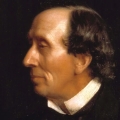
The storm shifts the signboards - Hans Christian Andersen
The storm shifts the signboards
A fairy tale by Hans Christian Andersen
In olden days, when grandfather was just a little boy and wore red trousers, a red jacket, a sash around his waist, and a feather in his cap - for that's the way little boys dressed in his childhood when they wore their best clothes - so many things were different from nowadays. There were often street pageants, which we don't see now, for they have been done away with, because they became old-fashioned; but it's fun to hear Grandfather tell about them.
It must have been quite a show to see the shoemakers move their signboard when they changed to a new guild hall. A big boot and a two-headed eagle were painted on their waving silken banner; the youngest journeymen carried the welcome cup and the guild chest, and had red and white ribbons dangling from their shirt sleeves; the older ones wore naked swords with lemons stuck on the points. They had a full band, and the best of their instruments was "The Bird," as Grandfather called the long pole with the half moon and all sorts of sounding dingle-dangle things on it - real Turkish music. It was lifted up and swung, and it was dazzling to the eyes when the sun shone on all that polished gold and silver and brass.
In front of the procession ran a Harlequin in clothes made of many-colored patches, with a black face and with bells on his head, like a sleigh horse. He struck the people with his wand, which made a noise without hurting, and the people pushed against each other to move back and forth; little boys and girls fell over their own feet right into the gutters; old women elbowed their way along, looking sour and scolding. Some people laughed and some people chatted; there were spectators on the steps and in the windows, and, yes, even on the roofs. The sun shone; a little rain fell on the people now and then, but that was a good thing for the farmers; and when finally they became wet through, that was a real blessing to the country.
Ah, what stories Grandfather could tell! When he was a little boy he had seen all that grand show at the height of its splendor. The oldest guild journeyman made a speech from the scaffold where the signboard was hung; it was in verse, just like poetry - which, indeed, it was. There had been three of them working on it, and before writing it they had drunk a whole bowl of punch, so that it would be really good. And the people cheered the speech, but still more they cheered the Harlequin when he appeared on the scaffold and mocked the speaker. The clown cut his capers so gaily, and drank punch out of schnapps glasses, which he then threw out among the people, who caught them in the air. Grandfather had one of them, which the plasterer had caught and presented to him. Yes, it was fun. And at last the signboard hung, decked with flowers and wreaths, on the new guild hall.
You never forget a sight like that, no matter how old you grow, Grandfather said. He himself never forgot it, though afterward he saw many things of pomp and splendor and could tell about them; but the funniest thing of all was when he told about the moving of the signboards in the big town.
Grandfather had gone there with his parents when he was a little boy, and that was the first time he had seen the largest town in the country.
There were so many people in the streets that he thought the signboards were going to be moved; and there were many signboards to move. If these signs had been hung up inside instead of out-of-doors they would have been filled up hundreds of rooms. There were all kinds of garments painted on the sign at the tailor's; he could change people from uncouth to genteel. There were signboards of tobacconists, with the most cunning little boys smoking cigars, just as in real life; there were signs with butter and salted herrings, minister's ruffs and coffins, and signboards that just carried inscriptions and announcements. Indeed, one could spend a whole day going up and down the streets and looking at the pictures, and at the same time you could learn what sort of people lived inside the houses, for they had hung their own signs outside. That is a very good thing, Grandfather said; in a large town it is instructive to know who lives in all the houses.
But then, something was about to happen to the signboards, just as Grandfather came to town; he has told me about it himself, and there wasn't then any twinkle in his eye, as Mother used to say there was when he was fooling me; he looked quite trustworthy.
That first night he came to the big town, the weather was worse than any we ever have read about in the papers, a storm such as there had never been within man's memory. All the air was full of roof tiles; old wooden fences were blown over; a wheelbarrow even ran for its life by itself along the street. The wind howled in the air; it whistled and it shook everything. It was indeed a terrible storm. The water in the canal ran over the banks, not knowing where it belonged. The storm swept over the town, carrying the chimneys with it; more than one old, proud church tower bent and has never been quite straight since.
A sentry box stood outside the house of the honest old fire chief, whose engine was always the last one at the fire; the storm begrudged him that little box and flung it down the steps and rolled it along the street until, strangely enough, it arose and remained upright before the house of the poor carpenter who had saved the lives of three people at the last fire. But the sentry box didn't give that a thought. The barber's signboard, a large brass dish, was torn off and carried across into the councilor's window. All the neighbors said this seemed almost like malice, for they, like the most intimate lady friends of the family, called the mistress "the Razor" - she was so sharp, and knew more about people than they knew about themselves.
A sign with a dried codfish drawn on it flew over to the door of a newspaper writer. That was a pretty poor joke on the part of the storm; it probably didn't remember that a newspaper writer isn't the sort of person to be joked about; he is a king in his own paper and in his own opinions.
The weathercock flew over to the roof of the opposite house, and there it remained - a picture of the darkest wickedness, said the neighbors.
The cooper's barrel was hung just under the sign for "Ladies' Apparel."
The restaurant's menu, which hung in a heavy frame near the door, was placed by the storm just over the entrance to the theater, where nobody ever went. It was a comical program, "Horseradish Soup and Stuffed Cabbage," but it made people go in.
The furrier's foxskin, which was his respectable sign, was hung on the bellpull of the young man who always went to morning church services looking like a folded umbrella, strove for the truth, and was "a model young man," said his aunt.
The sign "Establishment for Higher Education" was moved to the pool hall, and the Establishment itself received a board inscribed, "Babies Brought up Here by the Bottle." This wasn't really witty, only naughty; but the storm did it, and we can't control a storm.
It was a terrible night; and by morning, just think, nearly every signboard in town had been moved! In some cases it was done with so much malice that Grandfather wouldn't talk about it, but he laughed inwardly; I could see that, and it is possible he was up to some mischief.
The poor inhabitants of the big town, especially those that were not familiar with it, were all mixed up figuring out who was who; they couldn't help it when they judged by the signboards. Some people who thought they were coming to a solemn meeting of the town elders, assembled to discuss highly important matters, found themselves instead in a school full of noisy boys just about to jump over their desks.
There were even some people who mistook the church for the theater; and that was really awful!
There has never been such a storm in our days; only Grandfather saw one, and that was when he was a very little boy. Such a storm may never come in our time, but it may in our grandchildren's, and then we must hope and pray that they will keep indoors while the storm shifts the signboards!
* * * * *
Fairy taleHans Christian Andersen
Compare two languages:

















